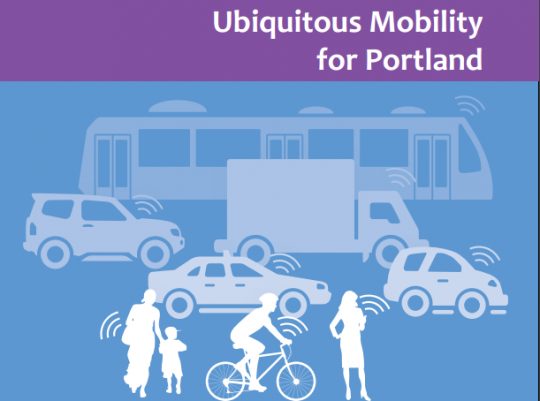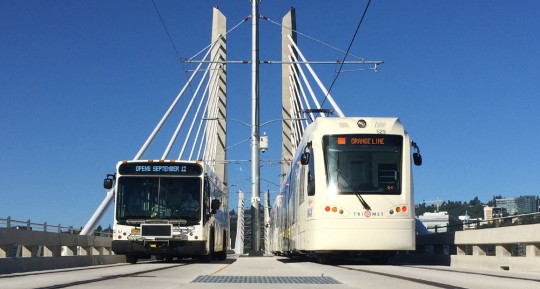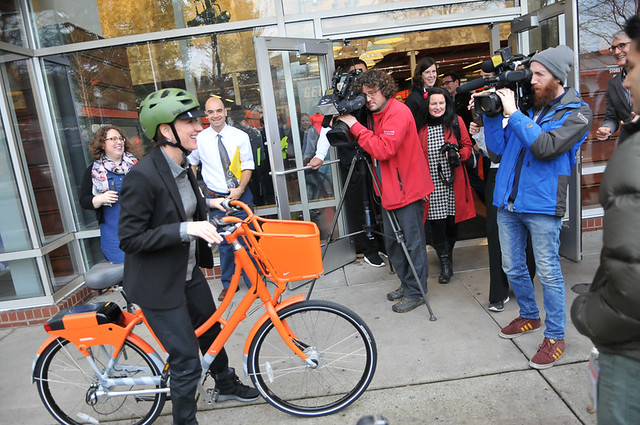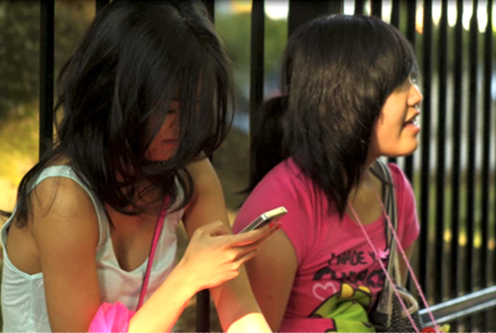
(Photo: M.Andersen)
Portland is one of 77 cities around the country that have put in for a one-time federal ‘Smart City’ grant that’s looking to promote big ideas about urban mobility.
An award is a long shot — only one city will get the $50 million prize — but the city’s application (which wraps together a wide variety of concepts for improving and integrating digital transportation data) is an education in itself, offering various details about the city’s vision that we haven’t seen publicly until now.
“For years, I drove to work downtown because I thought it was faster. A colleague showed me UB Mobile PDX and I started to think differently about my commute.”
— Testimonial from fictitious character in City’s grant application
Here’s one: The city is pretty far along in the process of envisioning a single all-purpose “marketplace” that would let smartphone users book and pay for trips by Biketown, TriMet, car2go, Spinlister or Lyft in the same app. Under the vision described here, the city could also integrate parking payments and even the pay-per-mile fee that’s been tested by the Oregon Department of Transportation as a replacement for the gas tax.
The theoretical app would let users weigh their options based on costs, travel times and other factors like carbon emissions.
A mobile app, though, would only be part of the benefit of the integrated system described here and dubbed “Ubiquitous Mobility for Portland” or (are you ready for this?) “UB Mobile PDX” for short.
Most of the programs would be almost invisible to the public, but it’d be working behind the scenes to enable big improvements to the city’s transportation system.
What the new system would do
The best way to understand the concept is probably to consider the cheesy but concrete “testimonials” from fictional residents that the city has put in the margins of its application.
As a working parent, getting the kids to daycare and myself to work on time is a constant struggle. With UB Mobile PDX, I can quickly find the fastest and cheapest option — especially on those days when I clock out late or traffic is bad.
I deliver freight to restaurants all over the city. UB Mobile PDX tells me the best route for the day and where I can find parking. Predicting where traffic isn’t has allowed me to add five more stops to my route each day and reduced the mileage fee that my company pays.
I am a transportation engineer at the City. With UB Mobile PDX, I use real time data from our own fleet vehicles to improve system efficiency. Little changes make a big difference — these changes made three planned intersection widening projects unnecessary.
For years, I drove to work downtown because I thought it was faster. A colleague showed me UB Mobile PDX and I started to think differently about my commute. Turns out, Portland has many great options and riding MAX is actually faster than driving at rush hour. I love seeing the dollars saved add up in my app.
At my age, driving isn’t easy, and the walk from the bus stop home can be daunting. With UB Mobile PDX, I don’t have to stay home. I can easily call a rideshare to pick me up from a bus stop and take me to my front door. The information — and volunteer who taught me to use it — has given me my freedom back.
I walk everywhere in my neighborhood, but sometimes wish the streets were safer. I know UB Mobile PDX is the first step in getting cars and trucks that warn drivers of potential crashes with pedestrians onto our streets. I can’t wait for a future when more people use this technology and pedestrian fatalities are a thing of the past.
Advertisement
Tilkum Crossing test area could be a test zone for self-driving transit
Last month we wrote about the possibility that self-driving cars threaten to wreck our transit system unless we also get self-driving buses that would greatly cut the cost of operating transit.
Portland’s proposal inches toward that possibility by creating “autonomous transportation pilot zones”:
UB Mobile PDX will provide the means by which autonomous vehicles can become mainstream. We have no doubt manufacturers will successfully solve technical issues, but there remains the issues of acceptance and adoption. To aid in this transition, Portland proposes to establish autonomous transportation pilot zones, beginning academic and institutional campuses, as well as a driver-assistance and collision-avoidance bus and train line on the new car-free and multimodal Tilikum Crossing.
This test of autonomous vehicles is presumably the “first step” toward zero fatalities referred to in the final testimonial above.
Bikeshare system plans to use ‘variable pricing and gamification’
When it launched, car2go kept its cars fueled by offering discounts to people who filled them with gas.
Similarly, Portland’s forthcoming Biketown system is planning to (eventually) keep its bikes distributed by offering discounts to people who end their trips in key destinations, like the tops of hills or the downtown core at 4 p.m.
In partnership with SoBi, Motivate, and Nike, PBOT is working to create an App that will not only give users real-time data on the location of the bike, but also include real-time route finding. It will be the most technologically advanced App on the bikeshare market. Portland will be the first city to introduce variable pricing and gamification to its bikeshare with the technology on the bike. Instead of rebalancing the bike system with trucks, Portland will use pricing and incentives, thereby reducing the overall carbon footprint of the bikeshare system.
City, state and port are laying the groundwork for “congestion pricing or tolling”
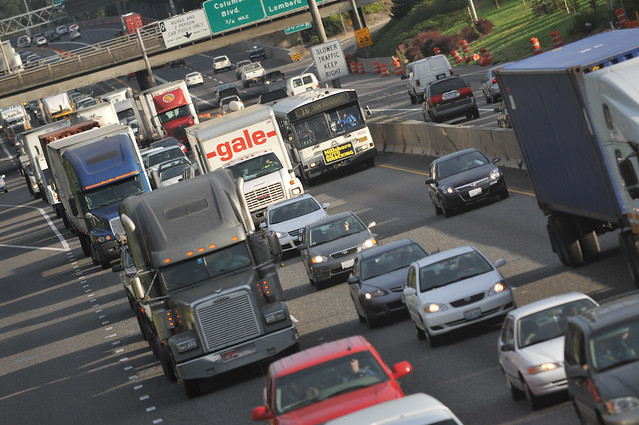
Here’s another tidbit has yet to be reported anywhere.
The City of Portland, in partnership with the Port of Portland, Metro, ODOT, and private sector freight and logistic industry stakeholders, is embarking on a Smart Freight Regional Strategy to facilitate the more efficient movement of goods, employees, and container services. The Strategy is focused on creating a coordinated and comprehensive data hub within various transportation services providing for the following:
• Intensive intelligent transportation system (ITS) management of key freight routes
• Congestion pricing or tolling on key freight corridors
• Facilitated cargo, container, and freight services into and out of the Port of Portland’s
aviation, marine, and industrial properties and along regional truck routes
• Coordination of port cargo schedules and rail schedule data
Congestion pricing is probably better described as decongestion pricing because that’s what it does: unclogs crowded roads by charging people to drive on them, so the only people who do are the ones who truly need to do so.
This is the only known way to control auto congestion over the long run, and it’s the force behind the transformation of central London that is about to see bikes outnumber cars during rush hour.
Application’s success depends on culture of cooperation
The idea of a single integrated mobility app isn’t revolutionary, but its existence would be. That’s because letting our many separate digital transportation databases talk to each other is much easier said than done.
If Portland has a shot at this, it’ll be because we’ve made a case that our cultural commitment to open data — such as GTFS, the transit data standard that TriMet co-created with Google and has now enabled transit apps across the country — has set us up to succeed.
If Portland selected as one of five finalists nationwide, it’d get $100,000 and a few more months to offer more concrete details about just how this would work.
Correction 1:20 pm: An earlier version of this story inaccurately said car2go offers free minutes to people who refuel cars. It launched with that system but no longer uses it.
— Michael Andersen, (503) 333-7824 – michael@bikeportland.org
BikePortland can’t survive without paid subscribers. Please sign up today.

